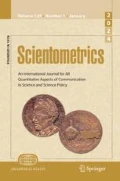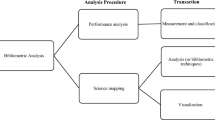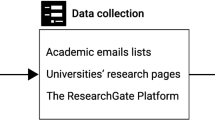Abstract
We are currently experiencing an era that is facing increasing global environmental and societal problems (e.g., climate change, habitat destruction and economic recession). Scientific research projects are often required to emphasize and counter the effects of inequity and globalisation, and prioritise cooperation supported by cooperative research. This paper investigates whether publication of research that is carried out in least developed countries is done in cooperation with research institutes from these countries. The study uses the Current Contents database of peer-reviewed publications from more than 7,000 journals in all sciences (Biology and environmental sciences; Physical, chemical and earth sciences; Engineering, computing and technology; Life sciences; Clinical medicine; Arts and humanities; Social and behavioral sciences) published between 1 January 1999 and 3 November 2000. From a total of 1,601,196 papers published, 2,798 articles of research activities carried out in the 48 least developed countries were selected using title information as an indicator. Collaborative relationships between research institutions involved was then analysed within and between countries and sciences. Our results show that publications of research, carried out in the least developed countries, do not have co-authorship of local research institutes in 70% of the cases, and that a majority of the papers is published by research institutes from the most industrialised countries in the world. We employed the use of questionnaires sent to authors from papers in the above-mentioned database to detect possible causes of this high percentage of lack of authorship in the essential academic currency that 'publications' are. 'Neo-colonial science' is identified as one of them. In addition, there exists a large discrepancy between what the surveyed scientists say they find important in international collaboration and joint publishing, and the way they act to it. However, the interpretation given to the fact that institutional co-authorship is underrepresented for local research institutions in the least developed countries is less important than the fact itself, and future research should concentrate on a scientific way to equilibrate this adverse trend.
Similar content being viewed by others
References
ACOSTA-CAZARES, B., E. BROWNE, R.E. LAPORTE, D. NEUVIANS, K. ROCHEL DE CAMARGO, R. TAPIA-CONYER, YANG ZE (2000), Scientific Colonialism and Safari Research, Clinmed/2000010008, BMJ Publishing Group, London, U.K.
AMIN, M., M. MABE (2000), Impact factors: use and abuse. Perspectives in Publishing, 1: 1-6.
ARUNACHALAM, S., S. GUNASEKARAN (2002), Diabetes research in India and China today: from literature-based mapping to health-care policy, Current Science, 82 (9): 1086-1097.
BAILEY, G. B., D. T. LAUER, D. M. CARNEGGIE (2001), International collaboration: the cornerstone of satellite land remote sensing in the 21st century, Space Policy, 17: 161-169.
ERFTEMEIJER, P., A. K. SEMESI, C.A. OCHIENG (2001), Challenges for marine botanical research in East Africa: results of a bibliometric survey, South African Journal of Botany, 67: 411-419.
GLäNZEL, W. (1992), On some stopping times on citation processes: from theory to indicators, Information Processing and Management, 28 (1): 53-60.
GLäNZEL, W. (2000), Science in Scandinavia: a bibliometrical approach, Scientometrics, 48 (2): 121-150.
GLäNZEL, W., U. SCHOEPFLIN (1999), A bibliometric study of reference literature in the sciences and social sciences, Information Processing and Management, 35: 31-44.
GLäNZEL, W., A. SCHUBERT, H.-J. CZERWON (1999), A bibliometrical analysis of international scientific cooperation of the European Union (1985-1995), Scientometrics, 45 (2): 185-202.
GLäNZEL, W., A. SCHUBERT (2001), Double effort = double impact? A critical view at international co-authorship in chemistry, Scientometrics, 50 (2): 199-214.
INTERNATIONAL ASSOCIATION OF UNIVERSITIES (2000), World List of Universities and Other Institutions of Higher Education, 22nd Edition. Macmillan Reference Ltd., London, U.K. 1632 p.
KATZ, J. S., D. HICKS (1997), How much is collaboration worth? A calibrated bibliometric model, Scientometrics, 40 (3): 541-554.
MELIN, G., O. PERSSON (1996), Studying research collaboration using co-authorships, Scientometrics, 36 (3): 363-377.
RAINA, D., S. I. HABIB (1994), Patronage, competition and rivalry: the structure of scientific exchanges in the age of colonialism, ORSTOM/UNESCO Conference on the 20 th Century Science: Beyond the Metropolis, 19-23 September, Paris, France.
SCHUBERT, A., W. GLäNZEL (1986), Mean Response Time: a new indicator of journal citation speed with application to physics journals, Czech Journal of Physics B, 36: 121-125.
SOKAL, R. R., F. J. ROHLF (1981), Biometry. W.H. Freeman and Company, New York, U.S.A.
VUB (1999), Research Overview. Research and Development Department, Vrije Universiteit Brussel, Brussels, Belgium.
Author information
Authors and Affiliations
Rights and permissions
About this article
Cite this article
Dahdouh-Guebas, F., Ahimbisibwe, J., Van Moll, R. et al. Neo-colonial science by the most industrialised upon the least developed countries in peer-reviewed publishing. Scientometrics 56, 329–343 (2003). https://doi.org/10.1023/A:1022374703178
Issue Date:
DOI: https://doi.org/10.1023/A:1022374703178




